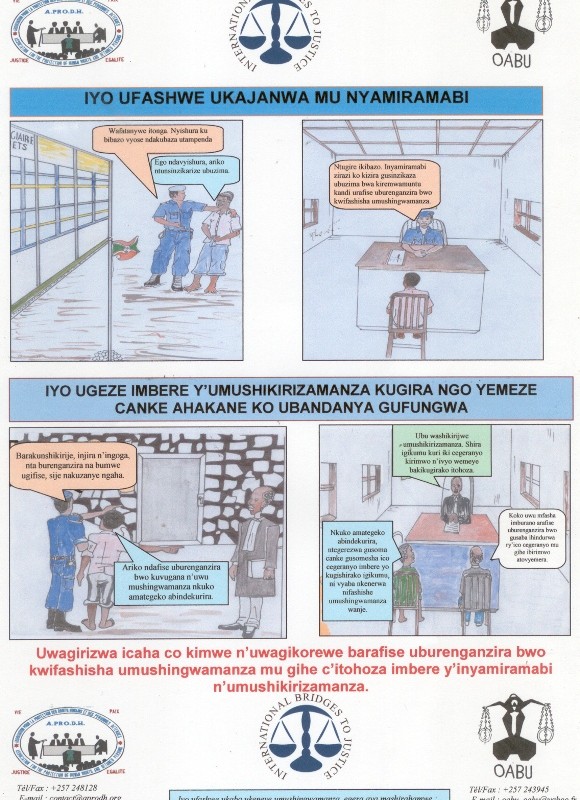
June 22nd to 28th was World AntiTorture Day and in Burundi as elsewhere a number of activities were planned to protest against its use. Only recently active in the country, IBJ dedicated itself to working with our local partner, APRODH, on a rights awareness campaign. As part of a USAID initiative, APRODH was given the chance to hold round-table discussions and advisement of rights campaigns in 4 different provinces. We decided to join them in the town of Ngozi, Burundi’s third largest city, to distribute “Know Your Rights” posters and to hand out questionnaires so we would have a better understanding of the real knowledge that the population has of its rights.Heading to Ngozi was a last minute decision, as the team was already very busy preparing for the forthcoming training-session. We decided that I would go to Ngozi with Laura and Nathalie, our new photojournalist interns, while Astère would stay in Bujumbura to deal with any emerging problems related to the training session. On D-Day, we went to APRODH to pick up our driver. He had already been sent on the field, but in the time it took to print out our questionnaires a second arrived to replace him. Ngozi is located roughly 120km north-west of Bujumbura. The two-hour drive it took to get there was the first time that the girls had left the capital city, and they discovered a totally different Burundi: luxurious vegetation, tea fields and colorful clothes, not to mention crazy drivers. Once we arrived in Ngozi I contacted the APRODH local observer who has been assigned to help us with our task. To our surprise not only the observer, but the entire APRODH delegation, led by Jean-Baptiste Sahokwasama, was waiting for us! Our initial welcome was followed by arrangements for a place to spend the night, and a little snack to recover our strength. Right after that, we got started.
Above: The “Know Your Rights” poster designed in Kirundi language in conjunction with the Burundi Bar Association and APRODH in 2007.
Our team, made up of 3 Burundians and 3 Bazungu (white people), traveled in the APRODH 4X4, better equipped than our little car to cope with the countryside’s winding, bumpy roads. Our first stop was the little village of Gasikanwa, where we immediately made for the office of the communal administrator. Prior approval from this official was needed in order for us to display our posters. The man was friendly but I could immediately feel the gap between Bujumbura and the remote localities. Our arrival was a major event. Word quickly spread that the Bazungu were in town, and a growing group of curious observers came to stare. This was not only an opportunity for us to fill out questionnaires, but allowed a delighted Nathalie to shoot pictures of the 50 children surrounding her. The group of villagers also demonstrated some of the challenges that IBJ will face as it tries to improve the human rights situation here, and in the rest of the country. It was almost impossible to find French-speakers, and there were even fewer English-speakers; no activities would have been possible without the help of APRODH’s translators. Moreover, it was clear that a significant part of the rural population is still illiterate, and it took 5 minutes each for the people we were surveying to reply yes or no to just 7 short questions; I had initially assumed that this task would only take a minute or so. It became obvious that we wouldn’t achieve our initial goal of collecting around 50 responses.
Above: IBJ Burundi Project Assistant Jean-Baptiste Bouzard explaining inhabitants of Ngozi what to do in case of arrest. (Photo by Nathalie Mohadjer).
Our second stop was at a vaccination center, built in the middle of farmland. There was incredible poverty here too but I also felt, for the first time, a degree of hostility towards foreigners. Women didn’t want to answer our questions in front of their husbands and, as it was clear that we wouldn’t receive many responses we didn’t remain for long. Before we left, however, I exchanged a few words with a beautiful young woman, and was astonished to hear that at only 22 she had already given birth to 4 children. It shocked me to think that, born here, I could already have been a father of 5…
We then stopped by a little house on the side of the road. A man was preparing Ibitumbura, or local donuts. We offered him some of posters but he refused, and I was worried that this same atmosphere of suspicion would stand in the way of us doing our awareness work. However as one person then another decided to go ahead and take our posters the whole community decided, all of a sudden, that they did want what we offering. We were soon unable to meet the demand as numerous hands reached out, hoping to take one. A small crush followed, and we decided to head to our last stop for the day. We couldn’t stay for long, however. We were all tired after a long day and had only a few minutes left before beginning the drive back to Ngozi, as it is not entirely safe to drive by night in Burundi. We agreed to stop at a café and that our last interviewees would be the waitresses who brought us fresh sodas. After all, they were part of the population too!
After having driven the 40 km to Ngozi, we finished our day with a delicious dinner of goat brochettes in the cool high hills of Burundi. Laura and Nathalie were the first to leave, soon followed by the rest of the group. It didn’t long to get to sleep for any of us. We left Ngozi early the next day to be back in Bujumbura around 10am, just in time to clean the car and get ready to welcome the IBJ delegation arriving from Rwanda.

